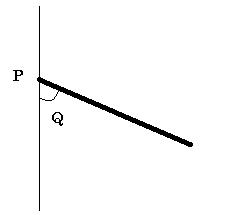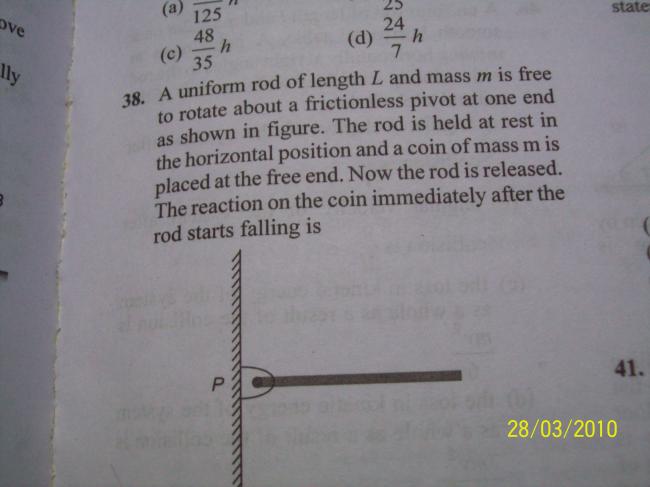P.S. I by mistake selected the wrong forum,it should be mechanics
13 Answers
I saw this question and immediately had a picture in my mind of a rod falling and the coin staying back due to inertia of rest. Is the reaction 0 ?
now i give a mathematical proof although i'm not too sure of it.
let at a certain instant the rod make an angle Q with the vertical.
Taking moment due to its own weight about point P (and assuming that no coin is placed )
mg sinQ . (L/2) = 1/3 mL2 . α
So Lα = 3g sinQ /2
As it is JUST released, Q→ π/2
so sinQ =1
so Lα = 3g/2
or acceleration of the end of the rod on which the mass m will be placed is 3g/2 which is > g.
So it's obvious that the mass m when placed will be falling freely as this acceleration is universal for all rods like this.
And due to free fall it gets no normal reaction from the rod.
So N = 0
This method needs verification from experts and PLEASE DO VERIFY MY ANSWER TOO.
But Whether this process is correct or not....I am 99% sure that the answer will be 0.
absolutly correct
in fact as we see the accln of the rod at end is >g
this happens wit long objects like falling chimneys which creates tremendous force on the bricks causing it to break into two
hence falling chimneys break
i must say, this rod is pretty strong [5]
I imagine myself in one such chimney bidding good-bye to the world in 2012 . :-) Pretty strong chimney it will be ;-)
YUP QUITE
"WE WERE WARNED" BY HITLER, BY KENNEDY AND BY THE MAYANS !!!!
jokes apart!!
aveek tell me this ..
why did u not include the coin? well i did using the coin!! neway the answer is N=0...but verify which is right? mine or aveeks? coz we gotta get the right way of solving problems!!
including the coin and balancing torque:
mg.L+mg.L2=13mL2.α=13mL2.aL [a=accn of free end.]
giving a=92g
I haven't taken the coin because any universal body placed on this rod will face free fall .... even if it's not the coin of mass m. Had it been of mass A,B,C M, or any tom dick and harry it'd have faced the same consequence. because the acceleration of the end of this rod is universal for all bodies.
Remember a problem where a man stands on an elevator and it's asked to find out what is the effect if acc. > g for the elevator. we hadn't considered the mass of the man then !!!
and in what you've done...it shows that both the coin and the rod are falling with same acceleration 9g/2. Is this possible ??? I mean can the coin falling freely have a value of acceleration > g ever ?????
Well I don't know but geniuses are always right....and I'll once again lose to sb's solution !!! :-) ;-)
both u n sb r rite
the final conclusion to both of ur soln is same....acc >g in free fall...an impossibility
n as aveek pointed out....not taking coin's mass will not hurt...as we see that end of rod has acc >g
